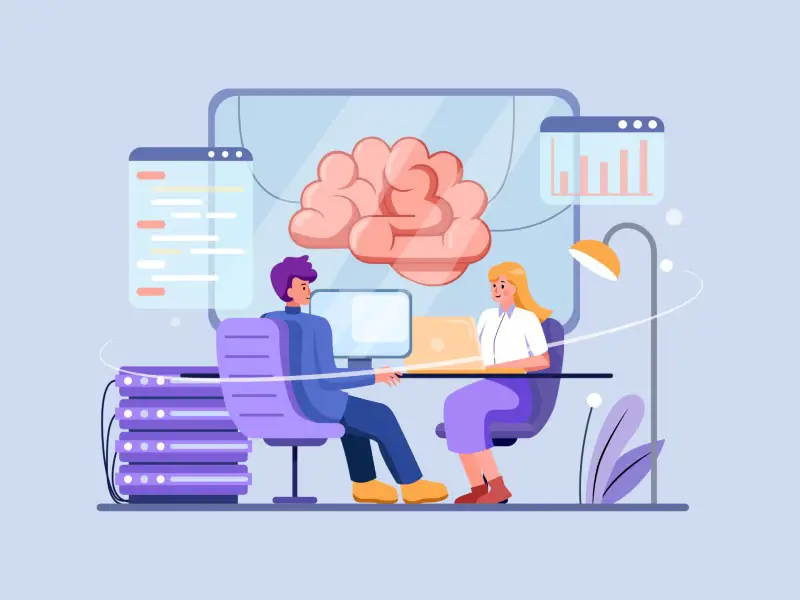Artificial intelligence (AI) has undeniably permeated every facet of our lives. From healthcare to finance, AI’s pervasive influence has transformed the way we live and work. This wave of AI innovation hasn’t left the legal field untouched either. It’s intriguing, therefore, to explore the intersection between AI and the realm of law, which is steeped in precedent and procedure.
This blog post examines the myriad ways AI interacts with law, impacts legal practices, and influences privacy policies. It will delve into understanding the legal aspects of AI, delineating the regulatory landscape for AI, its effects on legal practice, and its ramifications on privacy law and policy.
Whether you’re a tech enthusiast, a legal professional, or simply a curious reader, you’ll find this exploration both enlightening and thought-provoking. As we unpack the implications of this technological revolution on the legal field, we hope to highlight not only the potential benefits but also the challenges and ethical considerations it presents.
Artificial Intelligence and Deep Learning with Python
Are you wearied by deep learning resources that don’t clarify every single line of code? “Artificial Intelligence and Deep Learning with Python” revolutionizes the way deep learning, AI, and Python are introduced to beginners. The author draws an insightful analogy, equating a computer language with any other language, asserting that understanding every component of a sentence or a line of code is vital to generate novel ones. Unlike other resources claiming to be for “beginners”, this book stands out by dissecting and explaining every line of code.
There’s nothing more perplexing than encountering an unexplained line of code after an initially well-explained one. This book ensures a seamless learning journey with comprehensive explanations for each line of code in every project discussed, along with detailed insights into deep learning and AI concepts. Whether you’re a Python novice or a seasoned programmer, this book will guide you through the intriguing applications of Python in diverse AI and deep learning projects.
You’ll dive into captivating projects and topics, including:
- Deep learning applications in audio/music and voice recognition
- Neural network implementations with image files
- Creating an algorithm for predicting stock prices
- Applying AI through Thompson sampling
- Using deep learning for crime statistic predictions
- Binary classification with neural networks
- Building a Convolutional Neural Network (CNN) for your image files
- Teaching your computer to “read” and “comprehend” the English language
- SQL integration with neural networks
About the author: Steven D’Ascoli, an adjunct professor at St. John’s University, is renowned for his multi-disciplinary expertise.
The Intersection of Artificial Intelligence and Law
The marriage of artificial intelligence and law isn’t a matter of mere convenience. It’s a critical alliance shaped by the rapid evolution of AI technologies and the inherent complexities of legal systems. Legal systems worldwide are now grappling with the novel legal and ethical dilemmas posed by AI, from autonomous vehicles and facial recognition to predictive analytics and AI decision-making.
Consider autonomous vehicles, for instance, which raise fascinating legal questions about liability in case of accidents. Is it the manufacturer, the owner, or the AI itself that should be held responsible? Similarly, AI systems that use predictive analytics for criminal sentencing have sparked debates about fairness and transparency, as highlighted in the case of COMPAS, a tool used by U.S. courts.
A digital Marketing strategy can boost your website traffic. Learn more about Digital Marketing
Understanding the Legal Aspects of AI
AI’s legal implications extend far beyond mere intellectual curiosity. They influence policy-making, corporate responsibility, and individuals’ rights. The legal aspects of AI revolve around issues like data privacy, intellectual property rights, algorithmic bias, transparency, and liability.
The European Union’s General Data Protection Regulation (GDPR) provides a good example of a regulatory approach to data privacy in the AI context. It mandates certain rights for individuals, like the right to explanation and the right to opt-out of automated decision-making processes. Conversely, AI’s role in creating artistic or innovative output poses interesting questions about intellectual property rights. Can an AI own a copyright or patent? This question was recently tested with Dabus, an AI ‘inventor’ that sought patent rights.
Defining the Regulatory Landscape for AI
The regulatory landscape for AI is still a work in progress, a testament to the rapid evolution of AI technologies. Governments, regulatory bodies, and international organizations worldwide are working on developing robust and flexible legal frameworks to address the unique challenges posed by AI.
In 2021, the European Commission presented a proposal for an AI Act, aimed at ensuring AI’s trustworthiness and respect for European values and rules. In the U.S., there’s ongoing debate on federal regulations for AI, with several states implementing their regulations.
Embark on a journey to redefine your online business by exploring our e-Commerce wholesale platform, where you’ll find an extensive array of products and suppliers to elevate your retail game. Venture beyond the realms of conventional e-Commerce.
AI in Legal Practice: A Game Changer?
AI’s influence in the realm of legal practice is palpable. From predictive analytics and legal research to contract analysis and document automation, AI-powered tools are becoming increasingly prevalent in law firms and legal departments
AI’s role in legal practice isn’t limited to streamlining processes. It can also enhance the delivery of legal services and help professionals make more informed decisions. For instance, ROSS Intelligence, an AI-powered legal research tool, helps lawyers quickly find relevant case law and statutes, while Legal Robot uses AI to translate legalese into plain English, making contracts more understandable.
Notably, these advancements don’t signal the replacement of lawyers with AI. Instead, they underscore the shift towards ‘augmented law’ – a future where lawyers leverage AI to improve their services. However, the adoption of AI in legal practice isn’t without hurdles. It raises questions about the ethical use of technology, the accuracy of AI tools, and the need for lawyers to develop a baseline understanding of AI technologies.
The Impact of AI on Privacy Law and Policy
AI’s impact on privacy law and policy is significant and multifaceted. On one hand, AI technologies like facial recognition and data analytics pose new challenges to privacy. On the other, AI can be leveraged to enhance privacy protections and compliance.
AI-powered facial recognition technology, for instance, has been at the center of numerous privacy debates. A notable case is the Clearview AI controversy, where the company’s practice of scraping billions of images from social media platforms for its facial recognition software raised serious privacy concerns. This case has led to calls for more stringent regulations on the use of facial recognition technology.
Conversely, AI can also be a powerful tool for privacy law compliance. For example, AI can automate the process of privacy impact assessments or aid in the detection and reporting of data breaches, as seen with platforms like OneTrust.
Conclusion
As we navigate the nexus of artificial intelligence and law, it’s apparent that this convergence isn’t a straightforward one. It’s a dynamic, complex, and constantly evolving intersection that brings with it a host of opportunities, challenges, and ethical quandaries.
AI’s integration into the legal sector, from policy-making to legal practice, is transformative. It’s redefining traditional legal frameworks, challenging established norms, and paving the way for new legal and ethical discourses. Through real-world examples, like the European Union’s GDPR and AI tools such as ROSS Intelligence, we’ve seen how AI is not just disrupting the legal field but also creating opportunities for enhanced efficiency, decision-making, and service delivery.
Yet, the relationship between AI and law isn’t without its challenges. Issues of data privacy, algorithmic bias, transparency, and liability persist. Cases like the COMPAS tool and Clearview AI underscore the ongoing tensions between technological innovation and the protection of fundamental rights and freedoms.
The regulatory landscape for AI, though still maturing, is a crucial part of this narrative. The EU’s AI Act proposal and the discussions around federal regulations in the U.S. indicate the global efforts to create robust, flexible legal frameworks for AI.
In closing, the intersection of artificial intelligence and law is a compelling testament to the transformative power of technology. It’s a testament to the resilience of legal systems in adapting to this change, the challenges that lie ahead, and the collective responsibility we bear in shaping this convergence ethically, responsibly, and inclusively.

AI: A Green Revolution in the Agricultural Landscape
Artificial Intelligence is fueling a new Green Revolution, transforming agriculture with precision farming, sustainable practices, and smarter pest control. Discover how AI is shaping the future of farming, creating a sustainable, efficient, and productive agricultural landscape



